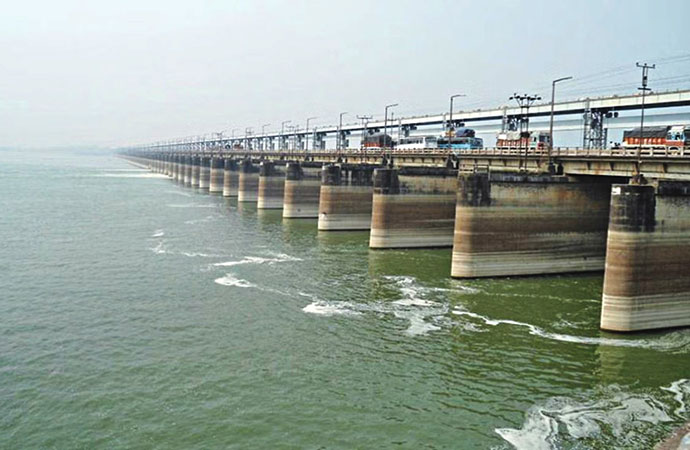Column

Farakka Barrage. Photo: Collected
Bangladesh and India share 54 transboundary rivers. Bangladesh has the distinction of having the largest number of transboundary rivers among any country in the world. Water security has been a matter of significant concern, interest and priority since Bangladesh was established. Water is an important element of human security along with food and energy. Human security is now recognized as a dimension of the securitization discourse which has evolved from the orthodox notions of military security into encompassing a wide range of non-traditional security matters like water. The human right to water was recognized by the United Nations General Assembly in a resolution in 2010.
There have been significant developments in international law which can influence how states make use of transboundary rivers. The most important of these has been the 1997 Convention on the Law of Non-Navigational Uses of International Watercourses. In 2010, the International Court of Justice emphasized the need to conduct an Environment Impact Assessment for infrastructure projects in transboundary water systems. Scholars have alluded to notions of a community of interest, interdependent sovereignty and cooperative sovereignty to preclude, prevent and resolve water disputes.
The Ganges Treaty between India and Bangladesh is set to expire in 2026. The treaty can be renewed by mutual consent in accordance with its provisions. Bangladesh's National Security Adviser Khalilur Rahman has called for "optimum cooperation" from India to renew the treaty. The sharing of the Ganges water has faced several problems since the treaty was signed. The treaty is often held out as an example of how water agreements are disregarded; and lack the political will for implementation. The credibility of the treaty hinges on India's political will to cooperate with Bangladesh for the environmental integrity of the region in the face of climate change and desalinization. As a riparian country, Bangladesh has to ensure the realization of the right to water for livelihoods and industrial activities from critically important international river systems like the Ganges-Padma, Brahmaputra-Jamuna and Surma-Meghna. Nearly 200 million people depend on these rivers for navigation, nutrition, irrigation and water supply.
Between 1975 and 1996, India unilaterally diverted enormous amounts of water from the Ganges which reduced the volume of river flow inside Bangladesh. The diversion was caused by the Farakka Barrage. India should consider reparations for the unilateral withdrawal of Ganges waters at Farakka; the environmental damage caused by the barrage has been criticized even by the Indian state of Bihar. The 1996 treaty aimed to ensure equal, unhindered and fair distribution of water. But the dry season saw insufficient water for both India and Bangladesh due to the longstanding environmental impact of Farakka. Dhaka and Delhi have differed over how to increase the river flow during the dry season.
Draft agreements on the Teesta and Feni rivers have been left pending. Delhi has cited objections from West Bengal for the delay in signing the Teesta accord. However, the Indian constitution empowers the central government to approve treaties with foreign countries through federal parliamentary legislation. Article 253 of the Indian constitution stipulates that "Parliament has power to make any law for the whole or any part of the territory of India for implementing any treaty, agreement or convention with any other country". Therefore, Delhi can override unreasonable objections from Kolkata if it chose to.
India's proposed river linking project also threatens to divert water from many of Bangladesh's transboundary rivers. 84% of Bangladesh's water is provided by transboundary rivers. These watercourses are the main arteries of inland transport and provide employment to millions of people. 40% of Bangladesh's net arable land is cultivated through irrigation using river waters. The diversion of water on the Indian side has led Dhaka to consider projects like the Ganges Barrage in Rajbari to regenerate river systems in the tributaries of the Ganges inside Bangladesh.
The flow of the Teesta River in Bangladesh has been significantly reduced due to water diversion at the Gajoldoba barrage in West Bengal. China has proposed to support Bangladesh for the Teesta River Comprehensive Management and Restoration Project. It is imperative for Bangladesh to develop downstream water infrastructure to augment the flow of its rivers. Dhaka should carry out environmental impact assessments to secure its rightful share of water.
The bilateral Joint Rivers Commission has often seen a divergence of views rather than convergence and consensus between India and Bangladesh. Multilateral mechanisms should be considered for the region, particularly in light of Chinese plans to dam the Brahmaputra River's source in Tibet. The absence of a dispute resolution mechanism in the Ganges Treaty has been a key drawback of the treaty. Renewal negotiations must consider the inclusion of a clause for dispute resolution.
In the case of Pulp Mills on the River Uruguay, the International Court of Justice held that when a "proposed industrial activity may have a significant adverse impact in a transboundary context, in particular, on a shared resource", environmental assessments become mandatory under general international law to ensure riparian countries are not adversely affected. India's construction of the Farakka and Teesta barrages resulted in an adverse environmental impact downstream in the river flows of Bangladesh. India should consider reparations which should primarily focus on restoring the natural flow of rivers downstream in Bangladesh.
In a dispute between Hungary and Slovakia, the International Court of Justice refused to rule against Slovakia for the unilateral construction of a dam project abandoned by Hungary. Bangladesh must not feel constrained in asserting its sovereignty for water infrastructure projects like the Rajbari barrage. As the downstream and low-riparian nation, Bangladesh must take necessary steps for storing water. This is important for irrigation, navigation and water supply.
Water has been an emotive issue in Bangladesh. Water disputes with India are prone to politicization. Politics can also have a positive impact by promoting cooperative sovereignty between states in the context of deepening democratic spaces and supported by institutional responses to water disputes.
Umran Chowdhury is a Research Associate at the Cosmos Foundation and Bay of Bengal Institute.

























Leave a Comment
Recent Posts
Auspicious beginnings, but a l ...
The newly elected government of Bangladesh is now in office, and the e ...
Caught between tigers and pira ...
Over 10,000 fishermen in the Sundarbans have suspended their fishing a ...
Historic Chawk Bazar comes alive with iftar items on ..
Shaping Young Conservationists: School Conservation ..
Iran has said it has reached an understanding with t ..
New Finance Minister Amir Khosru Mahmud Chowdhury